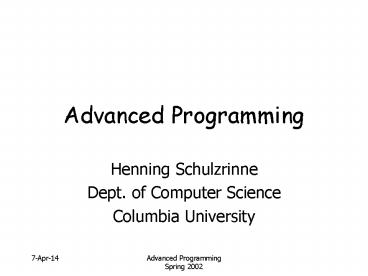Advanced Programming - PowerPoint PPT Presentation
1 / 17
Title:
Advanced Programming
Description:
Spring 2002. 5. Differences to Software Engineering ... Spring 2002. 6. Who should be here? Know Java (and 313x), but no or little C/C ... – PowerPoint PPT presentation
Number of Views:504
Avg rating:3.0/5.0
Title: Advanced Programming
1
Advanced Programming
- Henning Schulzrinne
- Dept. of Computer Science
- Columbia University
2
Overview
- Background
- What is Advanced Programming?
- Differences to old Software Engineering
- Who should be here?
- Syllabus
- Logistics
- Grading
3
Background
- Experimental course trial run for replacement
for traditional CS 3156 (Software Engineering) - Sequence
- Intro modules, few dozen lines
- DS few hundred lines, stand-alone
- AP larger programs, different languages and
styles - OS, networking, ISP, specialized knowledge
4
What is Advanced Programming?
- Become comfortable with multiple languages
- Multiple programming styles
- Professional programming
- program building
- multi-person code development
- systematic debugging
- performance tuning
- Goal robust, performing, industrial-strength code
5
Differences to Software Engineering
- Less emphasis on software engineering principles
- more on tools and techniques
- some SE is best read, rather than lectured
- hopefully, SE will make more sense afterwards
- CS4156 will remain
- Group programming project?
6
Who should be here?
- Know Java (and 313x), but no or little C/C
- Likely doing systems or general track
- Want to do well in OS, DB, Networks,
- Interested in how real systems work
- Affinity for programming, not complexity theory
7
Syllabus
- C programming language for Java programmers (2
weeks, 2 assignments) - summary of differences
- pre-processor
- strings
- stdio
- pointers and pointer arithmetic
- malloc/free
- unions
- function pointers
8
Syllabus
- Software development models, including open
source - Software development tools
- Unix
- make
- automake
- autoconf -- cross-platform development
- CVS
- doc and other documentation tools Oxygen
- gdb and DDD
- purify, ElectricFence
- truss
9
Syllabus
- profiling gprof
- Windows
- Visual C
- Code Warrior
- Program models data driven, event driven, cgi,
RPC, ... - UML
- Data interchange
- classical Unix style
- serialization
- XML
10
Syllabus
- Scripting languages
- sh
- awk, sed
- Tcl, expect
- Perl
- Python
- Standard Unix system call interface
- file access
- time and date manipulation
- system files
- process management
- signals
- getopt
- syslog
11
Syllabus
- Internationalization
- secure programming
- design patterns
- web programming models (servlets, cgi,
JavaScript, PHP, ...) - web database interfaces (JDBC, mySQL, ...)
- Time permitting (these topics are also covered in
CS 4118) - threads and concurrency
- shared memory
12
Logistics
- Web page http//www.cs.columbia.edu/hgs/teaching
/ap/ - Mailing list
- advanced-programming_at_cs.columbia.edu
- Mailman (lists.cs.columbia.edu)
- As-written or digest once a day
- Web archive newsgroup
- Office hours Th, 5.30-7.30 pm, 815 CEPSR
- TA Nikil Tiwari (nst8_at_columbia.edu)
13
Books - required
- Advanced Programming in the Unix Environment, by
W. Richard Stevens, Addison-Wesley. ISBN
0201563177 - Code Complete A Practical Handbook of Software
Construction, by Steve C McConnell, Microsoft
Press. ISBN 1556154844
14
Books useful reading
- Mythical Man Month, by Frederick P. Brooks,
Addison-Wesley. ISBN 0201835959 - Building Secure Software, by John Viega and Gary
McGraw, Addison Wesley. ISBN 020172152X - Software Project Survival Guide, by Steve C
McConnell, Microsoft Press. ISBN 0201563177
15
Grading
- Midterm 30, final exam 40, homework assignments
30 - Group project(s) - NO
16
Assignments
- Weekly programming assignments
- To be done individually.
- Conform to coding style guidelines.
- You will lose points if you don't follow the
guidelines.
17
Ombudsperson
- New course new problems
- Designated, random individual
- Act as relay for issues
- Assumed to speak for (subsection of) class, not
themselves - Quicker than mid-term review































